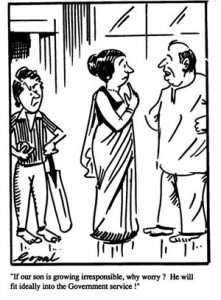Amidst claims of the NDA Government to have brought more generic drugs under pricing control, the Parliamentary Committee on Government Assurances (PCGA) submitted its report on 11th August this year regarding the pending assurances to control the prices of patented drugs, and it turns out; the Ministry doesn’t believe in keeping its promises.
The PCGA was instituted in 1953 and its primary function is to scrutinize the assurances, promises and undertakings given by Ministers on the floor of the House and report on the extent of implementation of these promises.
In this report, the Committee pulled up the Department of Pharmaceuticals in not so subtle language. According to this Indian Express report, the Parliamentary Committee uses terms like “gross negligence”, “lackadaisical attitude”, “vested interests” to describe the work (or lack, thereof) of the Department of Pharmaceuticals, which falls under the Ministry of Chemicals and Fertilizers (MCF). It found that the MCF had, in 2007, formed a panel to look into a price regulatory mechanism for patented drugs but failed to act in a “professional” manner as it did not bother to probe into the matter and a report of the panel was submitted only 5 years later in 2012. Read our earlier post on this issue here.
According to another news report, the PCGA Report said, “It is highly questionable as to why the ministry allowed that panel to submit its report in the matter after five years in 2012 that too without unanimity if not for gross negligence and lackadaisical attitude or vested interest,” the committee on assurances asked. “Evidently the ministry lacked will in this regard and did not pursue the matter in the right earnest”. The Ministry was further criticized for failing to even take any decision on the report of the first panel and instead, setting up a new inter-ministerial committee of joint secretaries in 2013 on the same issue.
Moreover, the Committee observed that “assurances from the 3rd session of 13th Lok Sabha to the 8th session of the 14th Lok Sabha are still pending for implementation even after a lapse of more than one and half years to 16 years“. This, according to the Committee, points to a failure of monitoring and implementation mechanism at the Ministry and undermines the sanctity of assurances given on the floor.
The Committee finally recommended a complete overhaul of the existing Ministry mechanism to make it more streamlined in order to avoid delays in implementation of assurances.
After the submission of this report, the Ministry defended its action by stating that a new committee needed to be set up in order to get a firm recommendation. The Ministry has also informed the PCGA that the new committee has completed consultations with the stakeholders and is now finalizing a report, which it will hand over in another 10 days, after a period of over two and a half years. We can only hope that this new committee Report meets the expectations of the public and fulfills the promises of the Ministers.
Unfortunately, I could not get my hands on the original report as the websites have not been updated with this latest development. A more detailed analysis of this report shall follow once it becomes publically accessible.
This fiasco comes after a series of controversies involving the National Pharmaceutical Pricing Authority (NPPA), also under the Ministry of Chemicals and Fertilizers. Their varying stance on price caps on patented drugs lead to both Pharmaceutical companies and NGOs taking up arms against them. We have previously covered several such instances here and here.
Drug prices are not just an Indian problem. The United States, where per capita prescription drug spending exceeds every country, is struggling to find a middle path between the welfare of the pharmaceutical industry and the public. The uniqueness of the US problem stems from the political power of the strong pharmaceutical lobbies, which lead to government-protected monopolies. Efforts to reduce drug price are thus not considered “politically feasible”.
However, in India, the government’s aggressive price cap policies are yielding polar opposite results. India’s pharma industry grew at 6.4% in April-June this year as opposed to 14.8% last year and according to analysts, price caps are to blame. However, there is one silver lining. The Goods and Services Tax (GST) legislation is predicted to be a win-win situation for both consumers and pharmaceutical companies, despite an initial inflation in drug prices.

